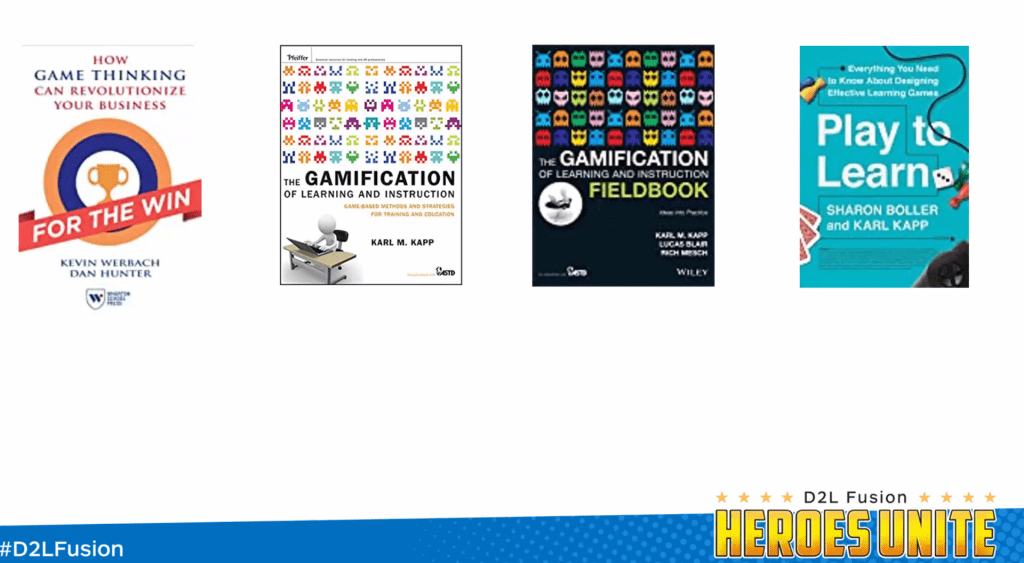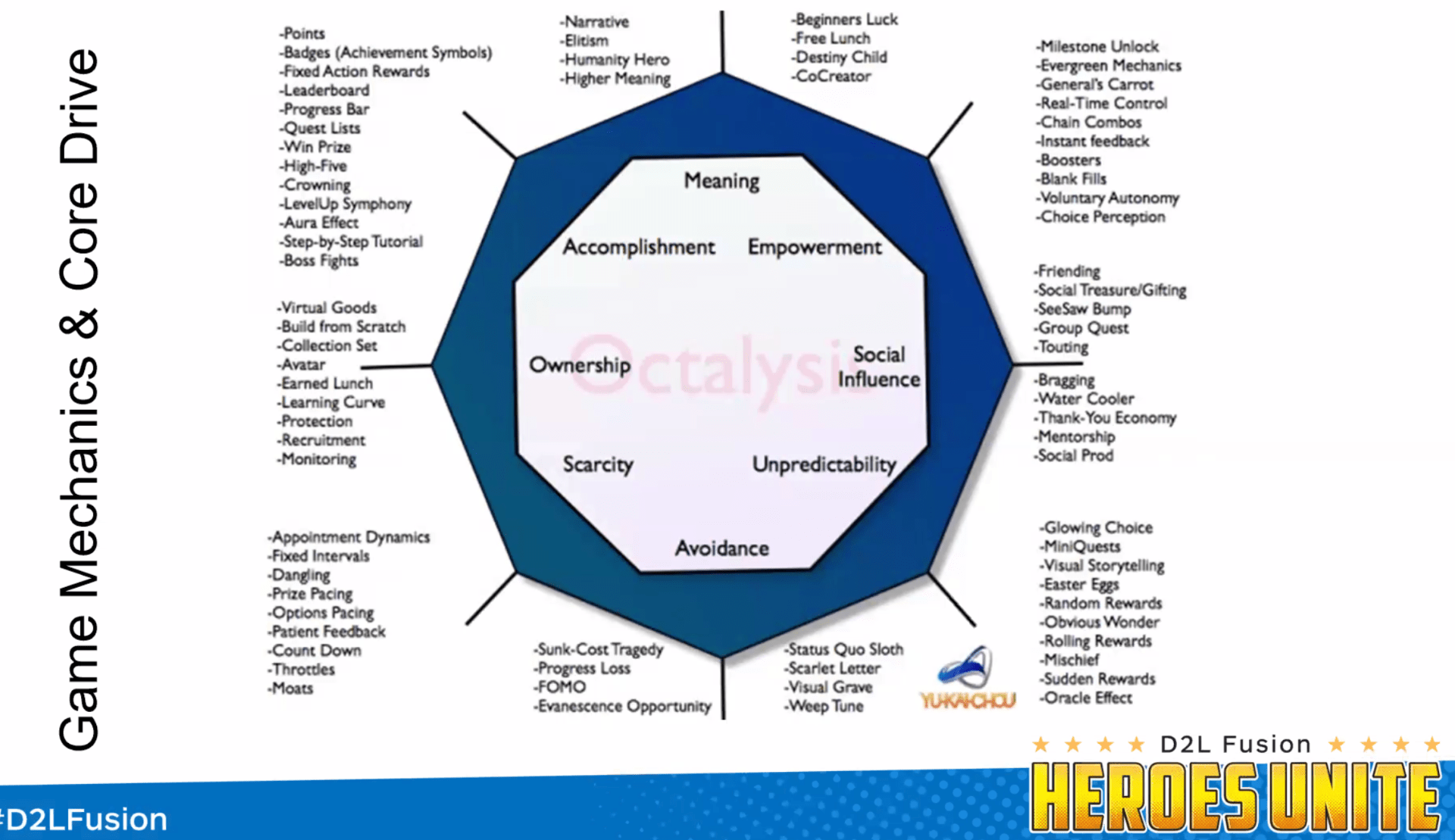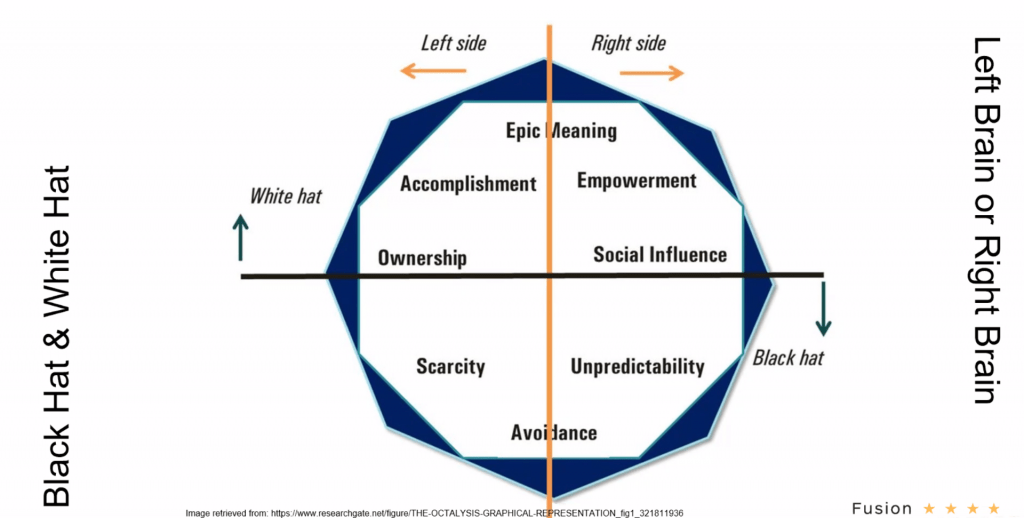Gamification Network: Exploring Gamification through the Octalysis Lens
Mary Nunaley
Karl Kapp The Gamification of Learning and Instruction
Kevin Werbach, Dan Hunter How Game Thinking Can Revolutionize Your Business
Yu-Kai Chou gamification design. Octalysis. https://www.gish.com/
8 core drives:
Meaning
Accomplishment
Empowerment
Ownership
Social Influence. social media, instagram influencers
Scarcity: scarcity with homework deadlines, coupons at the store
Unpredictability and curiosity. scavenger hunt in courses. careful when teaching.
Avoidance


Octalysis – the complete Gamification framework
Webinars
motivation

+++++++++++++++
https://yukaichou.com/octalysis-tool/
+++++++++++++++
https://island.octalysisprime.com/
+++++++++++++
https://yukaichou.com/
+++++++++++++
Home
++++++++++++++
++++++++++++
more on gamification in this IMS blog
https://blog.stcloudstate.edu/ims?s=gamification
https://www.spiegel.de/international/world/economist-jeffrey-sachs-on-the-u-s-after-the-election-a-18b6cc82-8db3-48e9-a55e-85a87c042b0d
Jeffrey Sachs was once a magnet for criticism over the market-based shock therapy he prescribed for Eastern Europe. Today, he is calling for the United States to move more in the direction of a social democracy, with Germany as a role model.
The man who was once the godfather of the birth of capitalism in Eastern Europe is now working to curb the influence of the free market in the United States. Sachs even endorsed self-proclaimed “socialist” Bernie Sanders for president.
+++++++++++++++++
more on history in this IMS blog
https://blog.stcloudstate.edu/ims?s=history
most on the Cold War in this IMS blog
https://blog.stcloudstate.edu/ims?s=cold+war
Podcast: The Link Between Academic Fraud and Cybersecurity Risk
https://campustechnology.com/articles/2020/10/23/podcast-the-link-between-academic-fraud-and-cybersecurity-risk.aspx
how essay mills operate and how academic fraud websites can lead to more serious cybersecurity threats. It’s a wild ride through falsified app reviews, shoddy workmanship and a rabbit hole of malicious activity.
+++++++++++++++
https://blog.stcloudstate.edu/ims?s=Academic+Fraud
more on academic fraud in this IMS blog
more on cybersecurity in this IMS blog
https://blog.stcloudstate.edu/ims?s=cybersecurity
https://cornellcollege.applicantpro.com/jobs/1568358.html
The Cornell College Center for the Literary Arts seeks a Distinguished Visiting Writer to teach a topics-based course in Writing Difference in a Digital World. Courses that engage race, citizenship, and/or identity through audio, video, or new media writing are especially welcome.
+++++++++++++
digital humanities in this IMS blog
https://blog.stcloudstate.edu/ims?s=digital+humanities
It’s 2020: Why Is The Internet Still Treated Like A Luxury, Not A Utility? from r/technology
It’s 2020: Why Is The Internet Still Treated Like A Luxury, Not A Utility?
https://gothamist.com/news/its-2020-why-is-the-internet-still-treated-like-a-luxury-not-a-utility
The city Board of Estimate first decided back in 1965 to slice up the city into cable-TV franchise fiefdoms, a setup that has survived largely intact in the internet era. Today, Altice (aka Optimum) has exclusive cable rights to the Bronx and southeast Brooklyn, while Charter (aka Spectrum, formerly Time Warner) has the rest of the city; Verizon FiOS is also available in a slowly expanding patchwork of areas overlying those two. As a result, most city residents have at most one other option if they’re unhappy with their current service, and many have none at all.
Americans weren’t always beholden to their local cable and phone companies for internet access, notes Christopher Mitchell, director of the Community Broadband Networks Initiative for the D.C.-based Institute for Local Self-Reliance. In the 1990s, thousands of internet service providers across the country offered dialup connections for relatively low prices, connecting via the copper wires of the phone system. The Telecommunications Act of 1996, he says, was initially designed to build on this by enabling multiple providers to use the new, faster networks that were then starting to be rolled out using higher-capacity coaxial and fiber-optic cable. It didn’t quite pan out.
“Both the Clinton and the Bush administrations dismantled that, under pressure from the big cable and telephone companies,” says Mitchell. “Most of those internet access providers went out of business, because they didn’t have access to the networks. If you have a policy that requires a company to pay $1,500 per home to get a subscriber, and it takes three to four years to earn that money back, you will not have much competition.”
The result has been a network of broadband services that are unaffordable or unavailable for a persistently high number of local households.
Torres noted that the city has spent nearly $300 million on renting otherwise-vacant hotels to house homeless New Yorkers during the pandemic, but hasn’t asked for the hotels to allow residents access to their broadband routers.
++++++++++++++
more on netneutrality in this IMS blog
https://blog.stcloudstate.edu/ims?s=netneutrality
https://www.vice.com/en/article/n7wxvd/students-are-rebelling-against-eye-tracking-exam-surveillance-tools
Algorithmic proctoring software has been around for several years, but its use exploded as the COVID-19 pandemic forced schools to quickly transition to remote learning. Proctoring companies cite studies estimating that between 50 and 70 percent of college students will attempt some form of cheating, and warn that cheating will be rampant if students are left unmonitored in their own homes.
Like many other tech companies, they also balk at the suggestion that they are responsible for how their software is used. While their algorithms flag behavior that the designers have deemed suspicious, these companies argue that the ultimate determination of whether cheating occurred rests in the hands of the class instructor.
As more evidence emerges about how the programs work, and fail to work, critics say the tools are bound to hurt low-income students, students with disabilities, students with children or other dependents, and other groups who already face barriers in higher education.
“Each academic department has almost complete agency to design their curriculum as far as I know, and each professor has the freedom to design their own exams and use whatever monitoring they see fit,” Rohan Singh, a computer engineering student at Michigan State University, told Motherboard.
after students approached faculty members at the University of California Santa Barbara, the faculty association sent a letter to the school’s administration raising concerns about whether ProctorU would share student data with third parties.
In response, a ProctorU attorney threatened to sue the faculty association for defamation and violating copyright law (because the association had used the company’s name and linked to its website). He also accused the faculty association of “directly impacting efforts to mitigate civil disruption across the United States” by interfering with education during a national emergency, and said he was sending his complaint to the state’s Attorney General.
here is a link to a community discussion regarding this and similar software use:
https://www.facebook.com/groups/RemakingtheUniversity/permalink/1430416163818409/
+++++++++++++
more on Proctorio in this IMS blog
https://blog.stcloudstate.edu/ims?s=proctorio
“Some of the more prominent companies offering these services include Proctorio, Respondus, ProctorU, HonorLock, Kryterion Global Testing Solutions, and Examity.”



